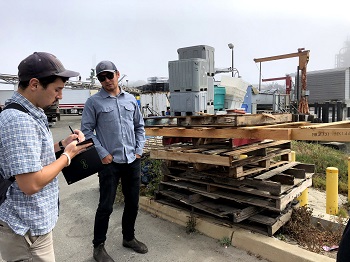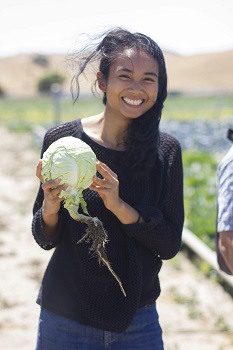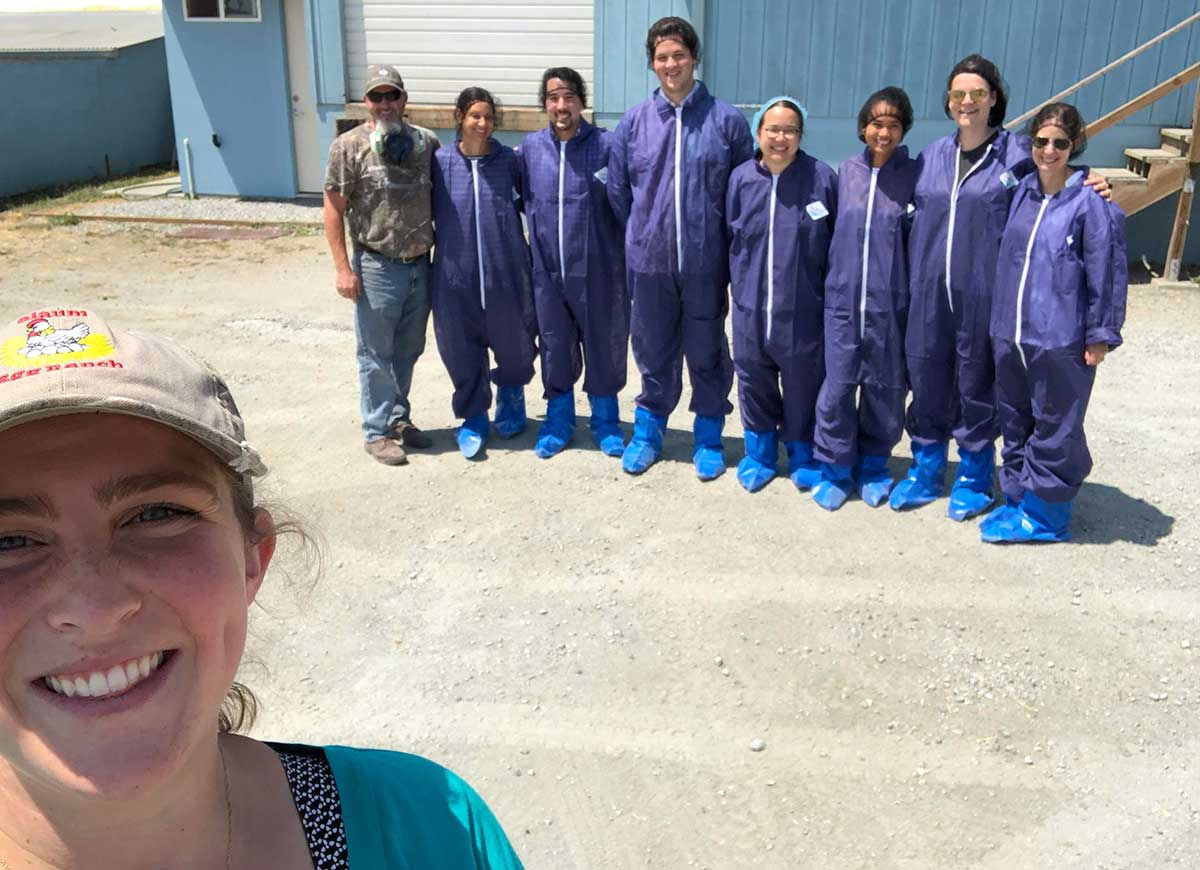Meet Northern California’s Suppliers of Local Fish, Cage-Free Eggs, and Fair-Trade Produce
 New Bon Appétit Fellows often spend their first couple of weeks visiting their local campuses and Farm to Fork partners to get a sense of Bon Appétit’s supply chain firsthand. New Fellow Taiyo Scanlon-Kimura is based in San Francisco, near corporate headquarters in Palo Alto, so he invited members of the national marketing and communications teams to join him in learning about sustainable seafood, organic vegetables, and cage-free eggs.
New Bon Appétit Fellows often spend their first couple of weeks visiting their local campuses and Farm to Fork partners to get a sense of Bon Appétit’s supply chain firsthand. New Fellow Taiyo Scanlon-Kimura is based in San Francisco, near corporate headquarters in Palo Alto, so he invited members of the national marketing and communications teams to join him in learning about sustainable seafood, organic vegetables, and cage-free eggs.

Fellow Taiyo Scanlon-Kimura takes notes during a conversation with Real Good Fish Founder and CEO Alan Lovewell
Real Good Fish Is a Real Good Community Partner
Although 90 percent of U.S. seafood is imported, a whopping 40 percent of what’s caught domestically is exported. As much as local food has caught on in the Bay Area, local fish is still mostly caught for export. Real Good Fish, founded in 2012 by Alan Lovewell (named a Champion of Change for Sustainable Seafood by the Obama White House), aims to remedy that. This community supported agriculture–style seafood operation in Moss Landing, CA, buys from local fisherfolk and distributes shares to their members throughout Northern California, as well as to Bon Appétit chefs as a newly enrolled Fish to Fork partner.
Coordinator Kirsten Jadoo led the tour, citing that Bon Appétit chefs buy rockfish, black cod, and sole, all species of groundfish that have made a remarkable comeback on the West Coast. Kristen gave the group an overview on permits, quotas, and other essentials of a fishing operation. Entering the fishing business is expensive and comes with several regulatory hoops; these barriers to entry for newcomers have contributed to the “graying of the fleet,” similar to the “graying of the fields” seen in the U.S. farmer population.
Real Good Fish aims to bring local seafood to a variety of consumers in the region, ranging from school districts to high-end restaurants. Currently they deliver as far north in California as Davis and as far south as Carmel.

National Marketing Coordinator Maria Deloso picks a cabbage at JAS
JAS Another Family Farm
In the afternoon following the Real Good Fish visit, the group met with Tony Serrano, the owner of JAS Family Farms Organics near the Salinas Valley, aka the “salad bowl of the world.” (JAS stands for José Antonio Serrano, Tony’s full name.) Tony’s introduction to agriculture started at age 8, when he interpreted contracts in English and Spanish for his father’s farm; he later ran a produce trucking business with his brother, and most recently managed farmer trainees at the Agriculture and Land-Based Training Association (ALBA), whose sales arm ALBA Organics is also a Bon Appétit Farm to Fork partner. All of these experiences are helping to make his relatively new 100-acre operation of strawberries, artichokes, squashes, cabbages, and Brussels sprouts a success. JAS is also enrolled in Bon Appétit’s Imperfectly Delicious Produce program.
Tony was exposed to pesticides twice as child, and feels a responsibility to grow safe, sustainable food for his family, driving him to seek organic certification. Additionally, JAS is the first small-scale farm in the U.S. to be certified Fair Trade, and the premium is passed directly to Tony’s workers. As a result of his varied background in agriculture, Tony believes strongly in rewarding everyone. As he puts it, “I don’t want my workers to worry about money.” Some of them apparently work for the love of it: Tony’s kids have been actively involved with the family business, and he says that they’re so enthusiastic about the farm that Tony can withhold summer work as a form of punishment.
Glaum Egg Ranch Takes Care of Employees
A few weeks later, Taiyo was joined by a group from Bon Appétit HQ at Glaum Egg Ranch in Watsonville, CA, where fourth-generation farmer Mikayla Glaum-Godoy and her father, Doug Glaum, hosted them at their egg barns. As is required for any egg producers who sell to Bon Appétit chefs, Glaum’s operations are Certified Humane and cage-free: they were the first commercial egg farm on the West Coast to achieve this certification. As Mikayla explained, Glaum also takes care of their employees, offering year-round employment, two weeks of paid vacation, and health insurance. “Happy employees mean happy birds who lay the best-tasting eggs,” Doug said. “I don’t want to be the biggest. I want to be the best.”
To lessen the environmental impact of their business, Glaum composts and sells the manure from their 140,000 birds. The hens in each 20,000-bird flock — two flocks of organic “browns” and four of standard “whites” — are the same age, and upon arriving at the farm they must be taught to lay eggs from perches. This involves waking up at 3 a.m. for a whole week to gently scoop sleeping hens off the ground so they become used to waking up on a perch, a task Mikayla began handling when she was 10.
As more egg producers have gone cage-free, Mikayla is looking to tell more of the Glaum story to help the farm stand out. She recently redeveloped the family store into a winery-esque finished space featuring eggs, aerial footage of their barns, and other local products.

Glaum Egg farmer Mikayla Glaum-Godoy takes a selfie-plus-group shot of the Bon Appétit team suited up for biosecurity before entering the egg barns: left to right: Mikayla’s father, farmer Doug Glaum; Chief Brand & Strategy Officer Maisie Ganzler; Fellow Taiyo Scanlon-Kimura; Marketing Intern Lucas Rochemont; Digital Content Manager Norris Mei; National Marketing Coordinator Maria Deloso; Public Restaurant PR & Marketing Manager Waverley Aufmuth; and National Marketing Manager Cheryl Sternman Rule